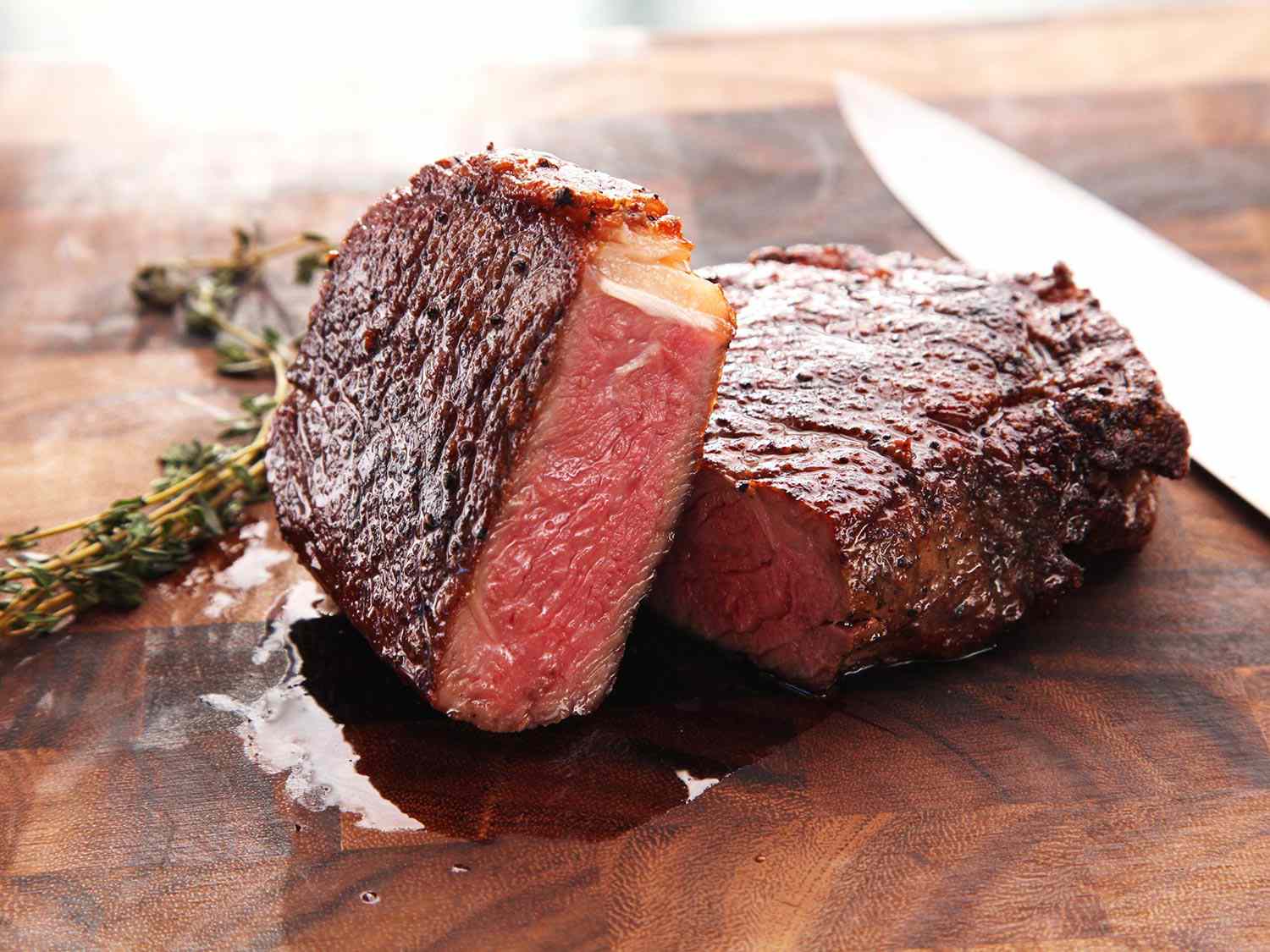Why YSK: When you cook meat, any water on the surface must first evaporate before much browning can occur. You want to get as much of a Maillard reaction as possible in the limited cooking time you have before the meat reaches the correct internal temperature. Removing the moisture first means that the heat of the cooking surface isn’t wasted on evaporation and can instead interact with the meat to form the complex sugars and proteins of the Maillard reaction.
Alternately, if you dry your meat with a duck it will promote the Mallard Reaction.
And if it’s steak especially, leave it out for a half hour to get closer to room temp before cooking.
This has virtually no impact. Salt is more important.
Depends on how you’re cooking. It’s all about that heat gradient!
Out on an open grill on medium heat for 20 minutes? Yeah, literally zero difference.
Pan fried on a cast-iron skillet that you’ve cranked up to ludicrous mode? That shit better be room temp if you want the inside to reach a safe temperature!
… and to those of you who cook steak but have never panfried: what are you doing? Get yourself some peanut oil, crank the heat to 11, and get cooking ASAP. Look up a guide because nailing the doneness will be hard, but I guarantee you that you’ll become a better cook after a few attempts. It’s a rite of passage, my fellow meatheads.
In the case of your own fried/ludicrous mode example, leaving the steak out at room temperature for even a few hours has basically no effect. It takes a long time for the bulk of the steak to warm any appreciable amount.
“After the first 20 minutes—the time that many chefs and books will recommend you let a steak rest at room temperature—the center of the steak had risen…not even a full two degrees…After 1 hour and 50 minutes, the steak was up to 49.6°F in the center”
I use a meat thermometer to gauge when it’s room temp, so I know how long it takes (spoiler: about a day).
I’m not great about food safety so keeping meat out that long is usually a recipe for food poisoning – that’s why I cheat by putting it in the microwave on 10% power for 3 rounds of 5 minutes. This usually gets the steak 90% of the way to room temp with minimal cooking (this obviously varies a lot by wattage and cut, that’s why thermometers are useful!). After that, I wrap the steak in cling-wrap and let it rest on the counter for another hour (the wrap helps prevent evaporative cooling) which gets the steak the rest of the way to room temperature.
A fresh steak should be safe to eat raw. I’ve never heard of a target temp for food safety for steak either tbh.
If anything bringing steak to “room temp” would be more likely to bring it in a danger zone.
I’ve never heard of a target temp for food safety for steak either tbh
Well… believe it or not there is a suggested internal temperature for cooking beef, even if it’s not ground. The CDC recommends 145F (~63C) and FSA recommends 70C (~158F). It’s certainly true that beef is one of the safer meats to eat at undercooked temperatures (at least in the U.S. & U.K.), but it’s also true that you can achieve just about any level of doneness beyond blue while still following food safety guidelines.
As I’ve said elsewhere, I have difficulty maintaining a super-sterile kitchen, so I can’t practically leave meat out at room temperature all day without risking food poisoning. I instead opt to expedite the process by microwaving at low power. Even if you view these guidelines as silly, there remains the practical application of being able to sear thicker cuts without leaving an overly raw center. When your total cook-time is <5 minutes, these things matter.
Cooking a fresh steak to 63 degrees sounds like a waste of money to me. ( And so does cooking chicken to 70) But I think we can all agree to that because we know those are the temperatures that indicate safety if it reaches that for 1 second. And lower temperatures over time are also good.
Generally I prefer reverse searing steak because it allows for a tender perfect inside with a hard crust and no gradients in the doneness. But if I don’t have time for that (or for a sous vide waterbath) I just cook straight out of the fridge in a cast iron while flipping every thirty seconds. And for anyone doubting that flipping 30 seconds is superior to not touching it before flipping once: your steaks will be less evenly cooked which I don’t like but you are free to do so ofcourse. Read Kenji’s article on it if you don’t believe me: https://www.seriouseats.com/the-food-lab-flip-your-steaks-and-burgers-multiple-times-for-better-results

They can’t stop you from ordering a steak and a glass of water!
There are people who cook wet meat? I mean there are people who do not know that baking soda is a wonderful tenderizer.
The wife is not a fan of my forking methods of tenderization.
Unbrowned steaks are surely regretted,
But Froyn just likes their meat wetted
So, both in kitchen and bed,
The same can be said:
Their wife just hates their forking method
thats interesting, now im curious if it would help for mine, i usually put a lite coating of oil on my steaks then cook at 700 degrees, i found the oil helps with the charring but still gets good marks on the meat.
Meat is murder y’all/s I prefer soy
How can you be certain plants aren’t also aware they are being killed? We already know that plants communicate with each other.
I like the murder. I just prefer the taste of soy
When we cook food a chemical reaction called the “Maillard reaction” occurs. It has both positive and negative effects. Some products of this reaction act as antioxidants, which are good for our health… but there is one product called acrylamide that is likely to cause cancer in humans. acrylamide forms from a substance called asparagine found in certain starchy foods like fried snacks, breakfast cereals, baked goods, and roasted coffee beans. The amount of acrylamide produced depends on how long you cook the thing, temperature, and other factors, making it hard to determine exactly how much acrylamide we eat from these foods.
Was this written by GPT?
YSK: Meat is bad for you, the planet and the animals.
User name is sus
I assure you I am not a penguin using the internet
It’s bad for the animals? Which ones, the ones we eat? Yes dying is quite bad for you. Meat is not bad for us, I guess it is bad for the planet but that is more of a overpopulation problem than meat problem.
Yes the ones people eat, getting killed is bad.
73 billion chickens are killed each year for profit/taste.Meat is generally pretty bad for us.
Meat is bad for the planet because it’s incredibly resource intensive.










